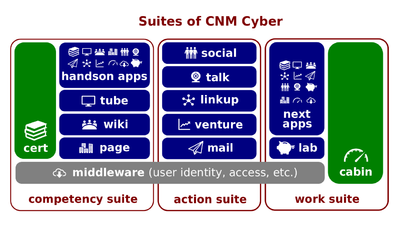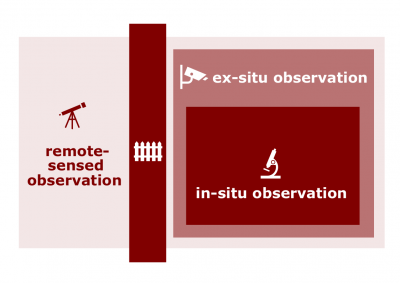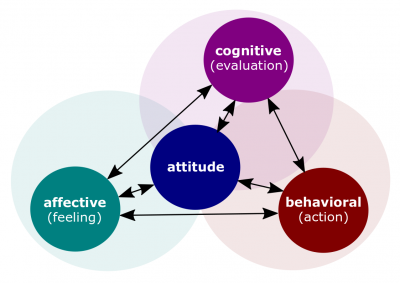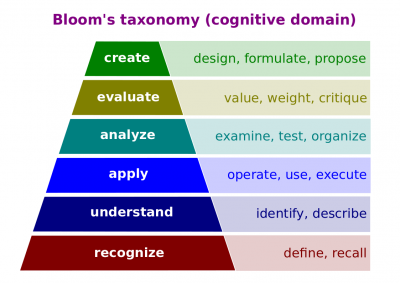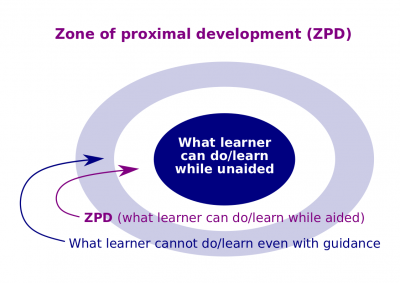Education Essentials
The Education Essentials (hereinafter, the Lesson) is the lesson of CNM Cyber that introduces its participants to CNM Cyber Orientation. The Lesson belongs to the Introduction to Education session of the CNM Cyber Orientation.
The Lesson is made up of three lectios. At CNM Cyber, the word, lectio, is used for a lesson part.
Contents
Summaries
Predecessor
- The predecessor lesson is Workforce Service Providers.
Outline
Education Essentials Lectios # Referred topics What Learning Is 1 What Education Is 2 What Recruiters Do 3
Successor
- The successor lesson is Educational Methods.
See also
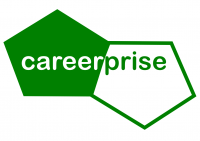
Education Essentials is the first lectio (or lesson part) in the Introduction to Education lesson. The lesson itself is the fifth in CNM Cyber Orientation. Consequently, the Orientation is the first stage of WorldOpp Pipeline.
This wikipage presents its full script and those test questions that are related to that lectio.
Education Essentials
- Main wikipage: Education Essentials; video (6:03)
- Learning. Any process of acquiring new, or modifying existing, behaviors, preferences, values, understandings, knowledge, skills, and abilities (KSA), as well as a result of that process.
- Purposeful learning. Learning that is undertaken with the purpose of learning.
- Occasional learning. Learning that occurs occasionally, without special intent.
- Observation. An act of recognizing and noting any subject, fact, occurrence, situation, and/or state of affairs, sometimes involving measurement with instruments, as well as the data-gathering technique that is based on watching something or someone.
- Observational learning. Learning that occurs as a function of recognizing, noting, retaining, and replicating behavior observed in one's environment or other people.
- Social learning. Learning from other people, both observational and through learning content delivery.
- Education. The process and/or product of facilitating one's acquisition of KSAs.
- Formal training (formal education). The education that is delivered under a formal curriculum and calendar that is officially approved usually by the government or some accreditation body. In most of contemporary countries, formal training consists of compulsory education and post-secondary education.
- Compulsory education. The part of formal training that is imposed by government and, with some exceptions, required of all people. In most of contemporary countries, compulsory education consists of primary education and secondary education.
- Individualized learning. One's learning based on one's individualized curriculum.
- Informal learning (independent learning). Any activity involving the pursuit of understanding, knowledge or skill which occurs without the presence of any approved curriculum.
- Curriculum. The aggregate of learning content and learning sequence of a particular course of study or all the courses offered by an educational institution, or their brief description.
- Prescripted curriculum. Any curriculum that is externally imposed in advance.
- Individualized curriculum. Any curriculum tailored to meet the needs of a particular learner.
- Learning content. The object of one's learning that is contained in something written, spoken, visualized, or created in any other way.
- Lecture. An oral presentation intended to deliver learning content or teach people about a particular subject. Usually, lectures are structured, prepared in advance and delivered by a credentialed lecturer, for instance, a college professor.
- Textbook. A compilation of learning content in a particular area of study.
- Development domain. One of three domains that group educational objectives according to their bases: (a) cognitive domain for development of knowledge, (b) affective domain for development of emotions, and (c) psychomotor domain for development of actions.
- Cognitive domain. The development domain that groups those educational objectives that target development of knowledge.
- Affective domain. The development domain that groups those educational objectives that target development of emotions.
- Psychomotor domain. The development domain that groups those educational objectives that target development of actions.
- Educational objective. A goal of gaining specified knowledge, skills, and abilities by a learner as a result of a specified learning activity or a set of activities.
- Bloom's taxonomy. One of attempts to classify educational objectives.
- Zone of proximal development (ZPD). An educational construct that indicates the area that a learner can learn only if he or she is helped by a more competent other. ZPD lies in between the area that the learner can learn on his or her own and the area that the learner cannot learn even with the more competent other's assistance.
- Training. The organizing of one's learning.
- Knowledge-focused training. The training that focuses on building learner's knowledge, especially work-related knowledge. The training that focuses on building learner's skills, especially work-related skills.
- Skills-focused training. The training that focuses on building learner's skills, especially work-related skills.
- Abilities-focused training. The training that focuses on building learner's abilities, especially work-related abilities.
Script
The video of the presentation is published at https://youtu.be/0uzVhrUtqxU (6:03). Here is its full text.
Overview
- Welcome to Education Essentials. In this brief presentation, we are going to take a look at education in general and the purposes of education including educational objectives and development domains that education aims to target. Let's roll the sleeves.
What education is
- Education is the process and or product of facilitating ones’ acquisition of KSAs, knowledge, skills, and abilities. Most are familiar with formal education; this is a type of education which is formally approved by a government or some accreditation body. If you studied at school, the school`s program was approved by the government or some agency. Some part of formal education which is called compulsory education is a mandatory, so usually it`s imposed by the government and with some exceptions required to some people.
- The formal education will include school and university, but compulsory education usually includes just school or a part of the school. Fortunately, or unfortunately formal education is not the only, it is probably the lowest, the minor part of what we learn or how we learn or how we educate ourselves with someone’s help or without and let`s say this lecture is not a part of formal education. If we will get to a more formal training then it will be approved by some accreditation body but for now this lecture is not a part of a school program, it`s not a part of a college, it`s just for you to get a glimpse of what we are about to offer.
Educational objectives
- Education has its objectives, an education objective is a goal of gaining specified knowledge, skills and abilities by a learner as a result of specified learning activity or set of activities. There is no one single classification of different objectives but one. The most very popular came from works of American educator whose name was Benjamin Bloom.
- Let's take a look at cognitive domain of Bloom`s taxonomy of educational objectives, in the base of his pyramid he put recognize or later understand, apply further analyze, evaluate and create. Recognize is the beginning, so let`s say we are about to learn a new language and initially you start recognizing some words, “hello.” And you say, “hello.” You recognize it`s a greeting but you don`t know part of the speech. Later when you go, you can go to a more understanding part so then you can describe and you can identify, you can say hello is an informal greeting. There are more formal like good evening or good afternoon. Then you can apply or start applying, operate, use, execute later you can analyze, examine, test, organize. You can put let`s say, “hello Jenifer” or, “John.” Well you can say, “John hello.” So you can test, examine, put in different parts then you can evaluate, or value, weight, critique, say hello is probably not too appropriate, and here you say, “good afternoon senator John Foster” or whatever and at the top of the pyramid, right now it`s great which is designed from Bloom`s taxonomy. Initially taxonomy proposed by Benjamin Bloom, the last two parts of the pyramid was revised. Initially it was synthesizing and then evaluate but for our purposes, it does not matter too much.
Development domains
- As fast as you note it discuss only cognitive domain but Benjamin Bloom identified three different domains and they coincide with attitude and so we talked about cognitive domain, which deals with knowledge, another domain which is effective which deals with emotions and here we are developing skills through hands on activities. Practice you will get some emotions or I like it or I don`t like it.
- There is the main, Benjamin Bloom called psychomotor domain. It deals with actions. Once again, knowledge, emotions and actions by Benjamin Bloom they were divided in three different domains.
Summary
- This concludes the Education Essentials presentation. We have defined education and used Bloom's taxonomy to take a look at educational objectives and development domains. If you haven't done yet so, you are now welcome to move to Educational Methods.
Quiz questions
- Every statement below is split into one true and one false question in the actual exam.
- Education is (not) the product and/or process of facilitating the acquisition of KSA's.
- Education can (not) be formal or self-directed.
- Formal education and self-education can (not) be combined.
- Only acknowledged schools, colleges, and universities can (not) provide one with education.
- Only acknowledged schools, colleges, and universities can (not) provide one with proper education.
- Only acknowledged schools, colleges, and universities can (not) provide one with formal education.
- Any employer can (not) serve as an educational institution.
- Any organization can (not) serve as an educational institution.
- Better schools (do not necessarily) lead to better education.
- Formal education is (not) learning that is facilitated only by acknowledged schools, colleges, and universities.
- Formal education is (not) learning that is organized by a learner him- or her-self.
See also
- Educational Methods. The second presentation in Introduction to Education.
- Workforce Service Providers. The last presentation in Introduction to Careers.
